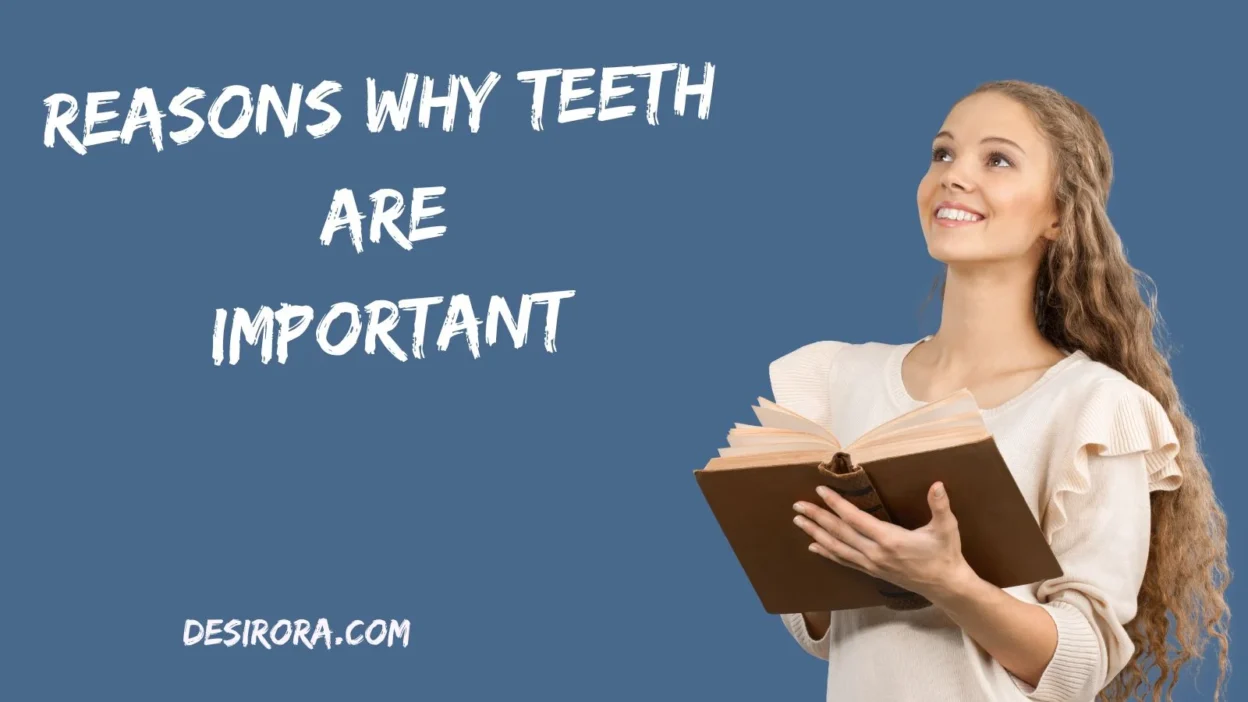Teeth might seem like small, simple parts of your body, but they play a massive role in your health, appearance, and confidence. Every time you smile, talk, or eat, your teeth quietly support you. From helping you chew your favorite foods to shaping your face and improving your speech, they do much more than you might realize.
Healthy teeth aren’t just about having a bright smile — they’re essential for digestion, nutrition, and even mental well-being. Unfortunately, we often take them for granted until something goes wrong. Understanding why teeth are important helps you appreciate their value and motivates you to care for them daily.
The Anatomy of Teeth and Their Unique Role
Each tooth is a small but complex structure designed for strength and function. Teeth are made up of:
- Enamel: The hard, protective outer layer.
- Dentin: A dense tissue beneath the enamel.
- Pulp: The inner part containing nerves and blood vessels.
- Cementum: A layer that anchors teeth to the jawbone.
Teeth work in harmony with the tongue, jaw, and facial muscles. They’re not just tools for eating; they’re essential to how you express yourself, communicate, and maintain balance in your body.
Why Teeth Are Vital for Daily Functioning
Chewing and Digestion
One of the main reasons why teeth are important is their role in chewing — the very first step of digestion. Teeth grind, tear, and crush food into smaller pieces, making it easier for your stomach to process nutrients. Without strong teeth, digestion becomes inefficient, and your body can’t absorb vitamins and minerals properly.
Example: Imagine eating an apple without teeth. It’s nearly impossible to break it down enough to digest. That’s how crucial teeth are for nutrient absorption and overall health.
Speech and Pronunciation
Your teeth help form sounds by working with your lips and tongue. Without them, it’s hard to pronounce certain words or letters like “f,” “v,” or “s.” This directly affects how you communicate, which impacts confidence and relationships.
Facial Structure and Aesthetics
Teeth maintain the shape of your face by supporting your lips and cheeks. When teeth are missing, your facial muscles sag, creating a sunken appearance. This makes you look older than you are. Healthy teeth preserve your youthful facial structure and natural beauty.
The Psychological and Social Importance of Teeth
First Impressions and Confidence
A smile is one of the first things people notice. Clean, healthy teeth boost self-esteem and make you feel confident in social and professional settings. On the other hand, poor dental health can lead to embarrassment and low self-worth.
Real-life example: People who undergo smile makeovers often report improved confidence and career growth. A simple change in your smile can completely shift how others perceive you.
Emotional Well-Being
Good oral health is tied to happiness. When you’re not worried about tooth pain, bad breath, or discoloration, you smile more often — releasing endorphins and improving your mood.
Cultural and Social Perceptions of Smiles
Across cultures, a bright smile is linked to friendliness, honesty, and warmth. In many societies, teeth are symbols of beauty and health. Keeping them healthy isn’t just a matter of vanity; it’s part of how we connect with others.
Health Reasons Why Teeth Are Important
Your mouth is the gateway to your body, and your teeth play a crucial role in overall wellness.
Connection Between Oral and Overall Health
Poor oral hygiene doesn’t stay in the mouth. Bacteria from tooth decay and gum disease can enter the bloodstream and cause inflammation elsewhere in the body. Research shows links between oral health and conditions like heart disease, diabetes, and respiratory infections.
Impact on Heart and Brain Health
Studies have found that gum disease can increase the risk of stroke, Alzheimer’s disease, and heart problems. Maintaining healthy teeth and gums helps protect your cardiovascular and cognitive health.
Role in Preventing Infections and Diseases
Your teeth and gums act as a barrier against harmful microbes. When you neglect them, infections can spread quickly, causing abscesses or even systemic illness.
Economic and Lifestyle Impact of Healthy Teeth
Job Opportunities and Professional Image
In job interviews or customer-facing roles, your smile can make a strong impression. Employers often associate good teeth with confidence, reliability, and professionalism.
Example: A 2023 dental study found that 74% of adults believe an attractive smile improves career opportunities. That’s a powerful incentive to take care of your teeth.
Cost of Neglecting Dental Health
Ignoring dental care can lead to expensive treatments later — root canals, crowns, implants, or dentures. Preventive care, like brushing and regular checkups, costs far less.
Quick Tip: Spending a few minutes daily on dental hygiene can save you thousands in dental bills over your lifetime.
Savings Through Preventive Care
Good oral hygiene isn’t just about health — it’s financially smart. Regular brushing, flossing, and dental cleanings help you avoid costly restorations and painful emergencies.
The Types of Teeth and Their Functions
| Type of Tooth | Location | Main Function |
| Incisors | Front of the mouth | Cutting and slicing food |
| Canines | Beside incisors | Tearing and gripping |
| Premolars | Behind canines | Crushing and grinding |
| Molars | Back of the mouth | Chewing and breaking down food |
Each type plays a distinct role, and together they make eating effortless and efficient.
How Teeth Influence Nutrition and Longevity
Strong teeth let you enjoy a variety of healthy foods — crunchy fruits, vegetables, and protein-rich meals. Missing or painful teeth limit your diet to soft foods, which may lack essential nutrients.
Chewing Efficiency and Nutrient Absorption
Proper chewing aids digestion and helps your body absorb more nutrients. Weak or damaged teeth often result in poor nutrition, which affects immunity and energy levels.
Dietary Choices
When teeth hurt, people tend to avoid fibrous foods like apples, carrots, or nuts — all crucial for health. Good teeth support a diverse, nutrient-rich diet.
Longevity and Quality of Life
People with strong teeth and gums often live longer. That’s because they can eat well, avoid infections, and stay active without dental pain or health complications.
Teeth Care: Habits That Preserve Their Importance
Keeping your teeth strong isn’t difficult. It’s about consistency and awareness.
Daily Hygiene Practices
- Brush twice a day with fluoride toothpaste
- Floss daily to remove plaque between teeth
- Use mouthwash to kill bacteria
- Replace your toothbrush every 3–4 months
Professional Dental Checkups
Visit your dentist at least twice a year. Routine cleanings help detect early signs of decay, gum disease, or other oral issues before they become serious.
Dietary Habits for Stronger Teeth
Eat foods rich in calcium, phosphorus, and vitamin D — like cheese, yogurt, leafy greens, and almonds. Avoid sugary snacks and sodas that erode enamel.
Modern Dental Advances That Protect and Restore Teeth
Today’s dental science makes it easier than ever to maintain or restore your smile.
Dental Implants and Cosmetic Dentistry
Lost a tooth? No problem. Implants and cosmetic procedures restore both function and aesthetics, improving chewing and confidence.
Fluoride Treatments and Sealants
Dentists often recommend fluoride to strengthen enamel and sealants to protect molars from decay — especially in children.
Technology and Preventive Dentistry
From laser treatments to 3D imaging, modern tools help detect and treat dental issues early, saving you time, pain, and money.
Real-Life Examples: How Teeth Change Lives
- Case 1: A teacher in her 40s regained confidence after getting veneers to fix discolored teeth — leading to better classroom engagement and self-esteem.
- Case 2: An elderly man who received dental implants was able to enjoy solid foods again, improving his nutrition and health.
- Case 3: A young professional reported higher interview success after straightening his teeth through orthodontics.
These examples show how healthy teeth affect not just your mouth — but your entire life.
Conclusion – Teeth: A Small Part with a Big Impact
Teeth are more than just tools for eating — they’re central to your health, confidence, and quality of life. From digestion to self-esteem, every aspect of your well-being depends on them.
When you care for your teeth, you’re investing in your future — physically, emotionally, and even financially. So, brush with purpose, smile with pride, and remember: your teeth deserve as much attention as any other part of your body.
FAQs
Q1. Why are teeth important to our body?
Teeth help us chew food, speak clearly, and maintain facial shape. They’re vital for digestion, confidence, and overall health.
Q2. How do teeth affect your confidence?
A healthy smile boosts self-esteem, enhances your appearance, and helps you feel more comfortable in social or professional settings.
Q3. Can bad teeth impact your overall health?
Yes. Poor oral hygiene can lead to infections, heart disease, diabetes, and other systemic conditions due to bacterial spread.
Q4. What’s the most important tooth in the mouth?
All teeth have unique roles, but molars are crucial for grinding food, while incisors help cut and canines tear.
Q5. How can I keep my teeth strong naturally?
Brush twice daily, floss, eat calcium-rich foods, stay hydrated, and limit sugar intake. Regular dental visits are essential too.

Thomas Hardy is a passionate innovator and thoughtful leader, dedicated to transforming ideas into lasting success. With creativity and purpose, he brings vision and authenticity to everything he does.



